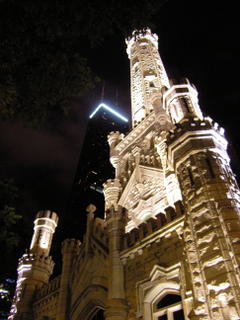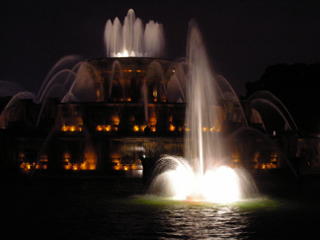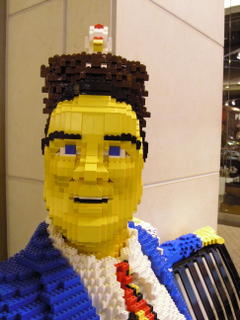is so lukewarm. It is devastating, devastating to see photographs of the Gulf coast, to hear on the radio the calls in to call-in shows from people in New Orleans who can't find their families ... Surreal to imagine swimming out of a second-story window ... Horrifying to imagine being trapped without even a window to swim out of ...
It is shocking that there was NO organized response for such a long time. Infuriating that all levels of government but especially the federal have been so extremely incompetent, and now this scandal. Louisiana Senator Mary Landrieu, quoted by Kevin Drum on his blog at the
Washington Monthly:
"I understand that the U.S. Forest Service had water-tanker aircraft available to help douse the fires raging on our riverfront, but FEMA has yet to accept the aid. When Amtrak offered trains to evacuate significant numbers of victims — far more efficiently than buses — FEMA again dragged its feet. Offers of medicine, communications equipment and other desperately needed items continue to flow in, only to be ignored by the agency.
"But perhaps the greatest disappointment stands at the breached 17th Street levee. Touring this critical site yesterday with the President, I saw what I believed to be a real and significant effort to get a handle on a major cause of this catastrophe. Flying over this critical spot again this morning, less than 24 hours later, it became apparent that yesterday we witnessed a hastily prepared stage set for a Presidential photo opportunity; and the desperately needed resources we saw were this morning reduced to a single, lonely piece of equipment. The good and decent people of southeast Louisiana and the Gulf Coast — black and white, rich and poor, young and old — deserve far better from their national government."
A Dutch news agency on the event: "ZDF News reported that the president's visit was a completely staged event. Their crew witnessed how the open air food distribution point Bush visited in front of the cameras was torn down immediately after the president and the herd of 'news people' had left and that others which were allegedly being set up were abandoned at the same time."
What can be said?
What can be said?
I am so angry with everyone. With the American people for electing this man again, with the media for their incompetent reporting on this administration and its agendas, allowing us to believe that it is less sinister, less incompetent than it is--The media is the new opiate of the masses, convincing us that there are two sides to every issue, so we may as well choose one that's easier to believe; shattering the world until it is so big that there is no impact we can have upon it, yet so small that it fails to contain people who exist for more than twenty seconds. I am angry, too, with the future which I fear will do nothing, nothing in response to the evidence that institutional racism is alive and well in this country, nothing in response to the poverty that clearly continues to exist in this First of the nations of the First World. I am angry that writing a check is a gesture with such little meaning to me, because it is all I feel I can do. (Well, make the check bigger, I suppose!)
Panelists on the News Hour (with Jim Lehrer) commented that they gained a new appreciation for Rudy Giuliani in seeing what the lack of him amounted to in the aftermath of the hurricane. It made me remember that it does make a difference, after all, that it's not all one mess of government-is-evil-at-worst-and- incompetent-at-best (there's a book I've been meaning to read about the effects of various administrations' economic policies, showing that they do have tremendously different impacts on people's lives). It made me wonder what qualities are really important to have in a leader, and whether our system of choosing leaders--at least at the presidential level--gives us much hope of finding people with those qualities. Or if we'll keep ending up with cardboard cutouts and ideologues, maybe getting lucky once in every fifty or a hundred years.
All of these thoughts lead to more thoughts, but I will truncate the process here. I need to plan for next week's classes. There's been some talk of incorporating discussions of Katrina and efforts toward relief in our curriculum, but I haven't had any brilliant ideas yet. "OK, so if the water is 20 feet high, and one pump can pump X gallons per hour, but there's no electricity to run the pumps, how many hours will it take to get all the water out?" Or "Here, kids, read this article about FEMA. I want you to underline all the reasons that the Bush administration is bad." (They're already very anti-Bush. For our reading campaign, I suggested that they take someone else's perspective and write about why reading might be important to that person; to give them some ideas, I suggested a grandma, a five-year-old, or the President of the USA. One girl actually wrote as Barbara Bush, and in her paragraph, which did describe the joys of reading, she managed to squeeze in some insults about her son ...)
Lukewarm, lukewarm. It must be, or life is impossible; if outrage were always red as blood, there would be no function for me in life. I would always be turning to the next thing, always emotionally exhausted, never good for much ... This is why people like Romeo Dalliere, Iris Chang try to kill themselves. Yet lukewarm is so ... argh. I have to pee.
 It doesn't feel like mid-autumn (more like mid-summer to me), but that's what it's called. Anyway, I was browsing the internet and found that Chicago's moon festival/mid-autumn festival was happening, so Patrick and I took the commuter rail up north to check it out. Here are the notable bits, in the order that I observed them:
It doesn't feel like mid-autumn (more like mid-summer to me), but that's what it's called. Anyway, I was browsing the internet and found that Chicago's moon festival/mid-autumn festival was happening, so Patrick and I took the commuter rail up north to check it out. Here are the notable bits, in the order that I observed them:



